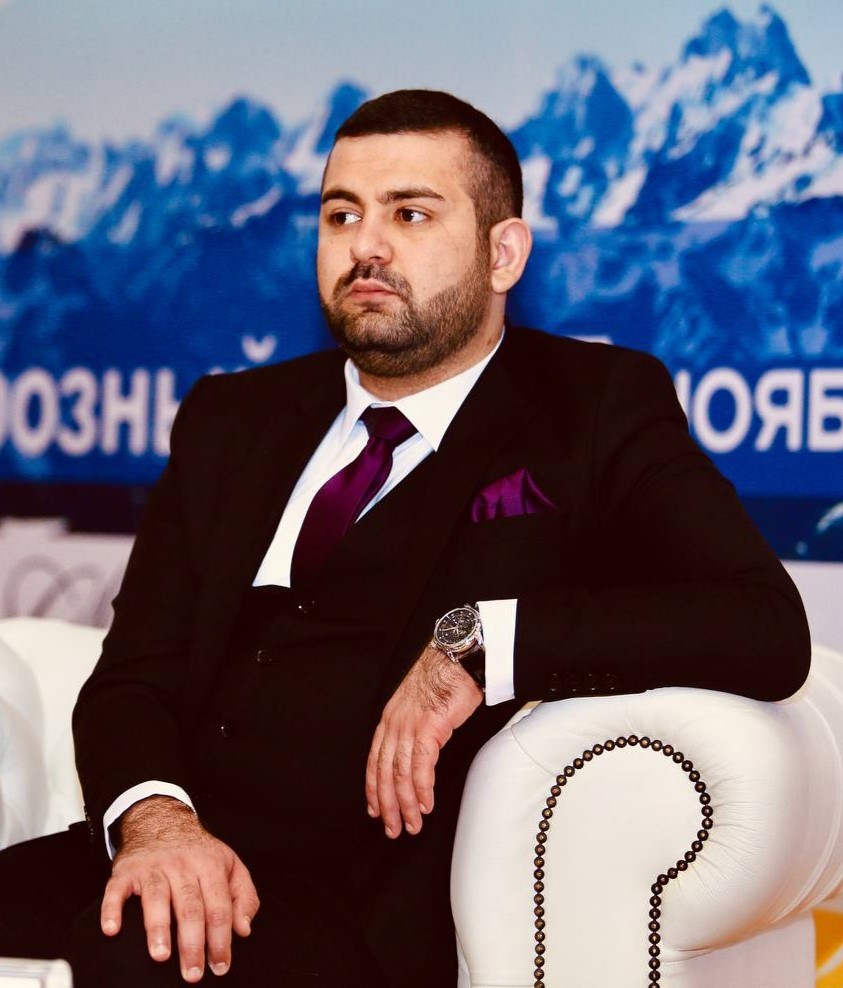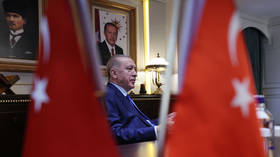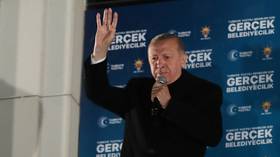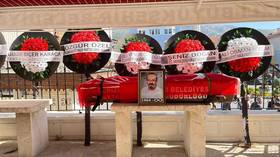Türkiye at a crossroads: Is the Erdogan era over?
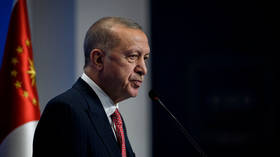
In the wake of the March 31 municipal elections, Turkish President Recep Tayyip Erdogan made a significant announcement, declaring them to be his final political contest within the bounds of current legislation. He stated, “For me, this is final. These elections are my last elections within the powers granted by the law. Following this, there will be a transition to my brothers who will come after me.” This marked a pivotal moment, not only for his career but potentially for Türkiye’s socio-political landscape as well.
Erdogan’s tenure as prime minister and later president, which began in 2003, has been characterized by a series of transformative policies that have significantly impacted Türkiye’s domestic and international position. However, the limitations set by Turkish legislation, requiring Erdogan to step back, hint at a broader shift underway, perhaps signaling the close of the Erdogan era.
The 2023 presidential elections underscored this sentiment. Erdogan secured victory in a closely contested run-off, garnering 52.18% of the votes against Kemal Kılıçdaroğlu’s 47.82%. This narrow margin, unprecedented in Erdogan’s tenure, suggests a changing political tide, which was further substantiated by the results of the recent municipal elections.
The municipal elections of March 31 revealed a stark transformation in Türkiye’s internal socio-political dynamics. The opposition’s People’s Republican Party (CHP) won in 36 out of 81 municipalities, a significant leap from previous years, indicating a rising tide of change. With a national share of 37.7% of the votes against the ruling party’s 35.4% and a voter turnout of 77.3%, these elections represented the opposition’s most substantial victory since Erdogan’s rise to power.
A focal point of intrigue was Istanbul, Erdogan’s birthplace, where he started his political career. Ekrem İmamoğlu of the CHP won the mayoral seat with a considerable margin, solidifying the opposition’s grip on Türkiye’s most populous city. Similarly, Ankara witnessed a landslide victory for the CHP’s Mansur Yavaş, further illustrating the shifting political landscape.
These elections also highlighted significant regional variations in political allegiance. While Erdogan’s party maintained dominance in central Türkiye, it also made notable gains in the south, regions recently devastated by a catastrophic earthquake. Conversely, the pro-Kurdish Peoples’ Democratic Party (HDP) took control of 10 provinces in the predominantly Kurdish southeast, indicating a diversification in political representation and priorities.
Perhaps most striking was the victory of the moderately Islamist New Welfare Party in Şanlıurfa province, a departure from Erdogan’s ally base, signaling a realignment in Türkiye’s political factions in response to domestic and international pressures, including the fallout from the war in Gaza.
These developments suggest a critical juncture in Turkish politics. Erdogan’s acknowledgment of his final term within the current legislative framework, coupled with the electoral gains of the opposition, points to a potential transformation in Türkiye’s socio-political landscape. As Erdogan’s era is possibly drawing to a close, the rise of new political forces and alignments beckons a period of introspection and potential redirection for Türkiye, navigating between its deep-rooted historical identities and the pressures of modern governance. The implications of this transition extend beyond Türkiye, potentially affecting its role on the global stage, particularly in relation to the West and the Middle East. As Türkiye stands at this crossroads, the unfolding political narrative will be critical in shaping not only its future but also its legacy under Erdogan’s leadership.
Türkiye’s economic crisis: No money, no honey
As Türkiye grapples with a profound economic crisis, the repercussions have echoed loudly in its political arena, particularly influencing the recent electoral outcomes. The nation’s struggling economy, marked by an inflation rate surpassing 65% and a national currency, the lira, which has lost 80% of its value over the past five years, stands as a testament to the challenging times faced by its populace. This economic downturn has played a pivotal role in the defeat of the ruling party, led by Erdogan, in the municipal elections.
Critics often accuse Erdogan’s government of failing to grasp the severity of the common people’s hardships amid this economic turmoil. Throughout the pre-election period, the opposition capitalized on growing concerns about the escalating cost of living, framing it as a key electoral issue. İmamoğlu, the popular newly-elected Istanbul mayor and opposition figure, notably campaigned under the slogan “Our country does not deserve poverty.” His criticism of Erdogan’s economic policies, which he argued “turned the laws of economics upside down,” resonated with the electorate, leading to his convincing victory and re-election for another term.
Erdogan’s promise to revive the economy was a cornerstone of his campaign for a third consecutive presidential term in 2023. Despite these assurances, the economic landscape remained bleak. Following the elections, Erdogan acknowledged his party’s defeat in a speech to his supporters from the presidential palace’s balcony. He interpreted the electoral outcome as a manifestation of the people’s will and a “turning point” rather than an end, asserting that democracy and the nation will emerge victorious. Erdogan pledged to address the shortcomings highlighted by the election results and continue implementing the government’s economic program, aimed at combating inflation.
The deep economic crisis in Türkiye and its influence on the political shift underscore the intricate relationship between economic health and political stability. The electorate’s response, favoring the opposition in light of economic dissatisfaction, signals a demand for change and accountability from their leaders. As Türkiye navigates through this challenging period, the government’s ability to enact effective economic reforms will be closely watched. The promise of addressing inflation and revitalizing the economy not only forms the crux of Erdogan’s future political agenda but also represents a critical test of his administration’s capability to respond to the pressing needs of its citizens.
This political recalibration in Türkiye, amidst economic adversity, highlights the resilience of democratic processes and the importance of economic governance in shaping political landscapes. The electorate’s shift towards the opposition, driven by economic grievances, suggests a broader call for transparency, reform, and a more equitable distribution of resources. As Türkiye strives to overcome its economic challenges, the world watches closely, recognizing the broader implications for regional stability and the global economic order.
Navigating toward a new era
The aftermath of Türkiye’s municipal elections has underscored a clear demand for transformation within the country, heralding what many see as the dawn of a new era. The victory of the opposition, particularly the CHP, has not only been interpreted as a mandate for change but also as a significant juncture in Türkiye’s political climate. Özgür Özel, a leader of the CHP, emphasized this sentiment, stating that the electorate’s decision “opens the door to a new political climate in our country, balancing the disproportionate power of the government at the municipal level.”
The electoral outcomes serve as a rebuke to Erdogan’s ruling Justice and Development Party (AKP) for its economic mismanagement and signal the reluctance of the urban secular population to support further Islamization. Despite personal criticisms, Erdogan remains a respected and beloved figure in Turkish politics, challenging narratives of authoritarianism that have emanated from the West. Indeed, the competitive nature of the electoral process in Türkiye has been reaffirmed, reinforcing Erdogan’s stature on the international stage and providing an opportunity for his administration to regain public favor.
Anticipating the path ahead, Türkiye is likely to witness a phase of liberalization in its domestic policy. The current leadership is expected to intensify efforts against corruption, enhance social support for the populace, and potentially implement personnel changes within the AKP, particularly at the regional level. This recalibration may also extend to reassessing alliances and partnerships.
On the international front, Ankara is poised to continue its rapprochement with the West, particularly with the United States and the European Union, leveraging this alignment to counterbalance opposition narratives while carefully maintaining relations with non-Western partners. This delicate balancing act in foreign relations reflects a strategic effort to navigate the complexities of global geopolitics, ensuring Türkiye’s interests are safeguarded amidst shifting alliances.
The municipal elections have indeed marked a pivotal moment for Türkiye, prompting a reflective assessment of its internal and external policies. The electorate’s call for change is clear, and the responses from both the ruling party and the opposition will shape the country’s trajectory in the coming years. As Türkiye stands at this crossroads, the actions taken by its leaders will not only define the nation’s political landscape but also its role on the world stage.
The path toward liberalization, transparency, and enhanced democratic processes offers a roadmap for addressing immediate challenges while laying the groundwork for sustainable growth and stability. As Türkiye navigates through these transformations, the enduring resilience of its democratic institutions and the strategic vision of its leadership will be crucial in steering the country toward a prosperous and inclusive future.
Adapting to the shifting global order
In the evolving tapestry of international relations, the old world order is being reshaped, heralding new rules of engagement on the global stage. This transformation necessitates strategic adaptations by all nations, with Türkiye facing its unique set of challenges and opportunities.
The decline of the unipolar world, dominated by the US following the Cold War, has given way to a more multipolar order. Emerging powers are asserting their influence, and traditional alliances are being reevaluated. For Türkiye, a country straddling two continents and multiple fault lines—geopolitical, cultural, and economic—the changing landscape offers a canvas to redefine its role.
Türkiye’s geopolitical significance has often been its ace in international relations. As the global order changes, Türkiye is repositioning its alliances. Its historical ties to the West through NATO and its aspirations for EU membership are being reassessed in light of the EU’s ambivalence and America’s shifting priorities. Meanwhile, Türkiye’s relationships with Russia and China are becoming increasingly significant, both economically and militarily. Balancing these relationships while maintaining its strategic autonomy will be crucial.
In a multipolar world, economic interdependence can be a double-edged sword. Türkiye’s economy, which has faced significant challenges, must adapt in order to thrive amid global economic shifts. Diversifying trade partners, attracting foreign investment, and enhancing technological innovation are steps towards securing economic resilience.
Türkiye’s role in regional stability, especially in the Middle East and the Eastern Mediterranean, has become more pronounced. Its actions in Syria, Libya, and the Nagorno-Karabakh conflict, among others, reflect its broader regional aspirations. Balancing these interventions with the need for regional stability will be a delicate endeavor.
The internal political landscape will also influence Türkiye’s global positioning. The rule of President Erdogan and the AKP has seen significant shifts in governance and policymaking. The outcome of the recent municipal elections and the economic situation suggest that voters seek change. How this translates into Türkiye’s foreign policy remains to be seen.
In conclusion, as the global order undergoes a period of transition, Türkiye stands at a crossroads. Its strategic location and historical legacy endow it with the potential to be a pivotal player in the new world order. However, this will require a deft balance of diplomacy, economic foresight, regional cooperation, and internal stability. The choices made by Türkiye’s leadership and citizens in the coming years will not only shape the nation’s future but also influence the emerging global landscape, where the interplay of power is more dynamic than ever.
